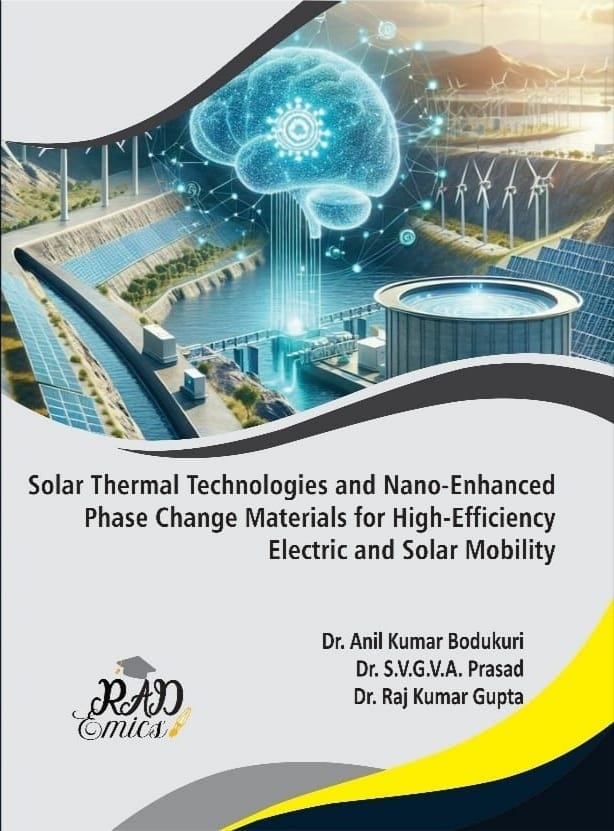
Author Name : P. Sabarinath, S. Poorna Chander Rao
Copyright: @2025 | Pages: 38
DOI: 10.71443/9789349552654-11
Received: 12/01/2025 Accepted: 04/04/2025 Published: 27/06/2025
The rapid transition toward sustainable transportation has intensified the need for innovative and energy-efficient charging infrastructures for electric vehicles (EVs). This book chapter presents a comprehensive framework for the design and optimization of solar-assisted EV charging stations integrated with thermal energy storage systems. By leveraging solar photovoltaic energy and advanced thermal storage solutions, the proposed model addresses the intermittency of renewable sources while enhancing energy reliability, demand flexibility, and operational sustainability. The integration of Internet of Things (IoT)-based architectures, smart grid functionalities, and data-driven control mechanisms enables real-time monitoring, predictive maintenance, and adaptive energy management. The chapter explores the role of cybersecurity, blockchain technology, and distributed energy resource management systems (DERMS) in securing and coordinating decentralized charging networks. The synergy between algorithmic intelligence and energy systems fosters an intelligent infrastructure that supports grid resilience, cost efficiency, and environmental goals. This multidisciplinary approach offers valuable insights for policymakers, researchers, and engineers in advancing the development of next-generation charging ecosystems. Emphasis is placed on optimizing energy flow, ensuring secure data communication, and enabling seamless interaction between vehicles, users, and the grid, thus contributing to the realization of a sustainable, intelligent, and inclusive mobility future.
The accelerating global transition toward sustainable transportation has catalyzed the integration of electric vehicles (EVs) as a core component of low-carbon mobility strategies [1]. Traditional internal combustion engine vehicles contribute significantly to urban air pollution and greenhouse gas emissions, necessitating a cleaner and more efficient alternative [2]. EVs offer a promising solution; Their environmental benefits are highly dependent on the source of electricity used for charging [3]. Reliance on fossil-fuel-based grids undermines the green potential of EVs, prompting the exploration of renewable energy-based charging solutions. Solar energy, with its wide availability and scalability, presents itself as a viable and sustainable energy source for powering EV charging stations [4]. Yet, solar power alone cannot guarantee uninterrupted availability due to its dependence on weather and diurnal cycles, creating the need for robust storage solutions to ensure reliability [5].
Incorporating thermal energy storage (TES) systems alongside solar photovoltaic (PV) panels provides an innovative approach to address the intermittent nature of solar energy [6]. TES systems store excess thermal energy generated during periods of high solar insolation and release it during periods of low sunlight or peak demand. This hybrid configuration enhances the reliability of solar-assisted EV charging stations and improves the overall energy efficiency of the system [7]. Unlike conventional battery storage, TES systems offer additional advantages such as long-life cycles, cost-effectiveness, and reduced environmental impact [8]. By integrating TES enables load shifting, peak shaving, and better alignment with time-of-use pricing models, making the system economically favorable for both operators and consumers [9]. This energy synergy forms a critical pillar in optimizing EV infrastructure for both urban and off-grid applications [10].